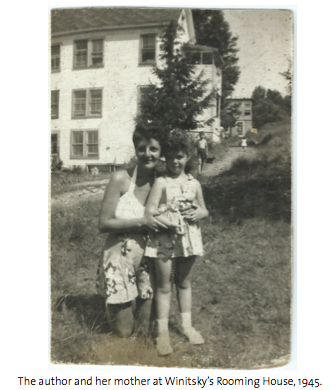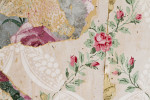Linda Tucker
A Catskill Summer
A 1940s season at Winitsky’s Rooming House with a new friend — one for whom “camp” means something very different.
When I was a little girl, Pagliaccio was my favorite companion. He went wherever I went, and although that wasn’t very far in my neighborhood, we traveled well together. The summer of 1945 was the first time Pagliaccio and I were truly going to be far from home, away from the hot pavement and sweltering sleepless nights. We were going to “the country,” my mother said, to a place called Monticello where there would be plenty of grass and where I might even have to pull up a blanket when I went to bed. My father, like all of the fathers that summer, would visit on weekends.
Pagliaccio and I waited in the back of our green Mercury while my father loaded all the things we needed into the trunk, onto the seat beside me, and even on top of the car: our own dishes and pots, our towels and sheets, medicinal supplies (in the event that something happened in “the country”), a couple of lawn chairs, suitcases of clothing, cartons of groceries, and a radio and my toys. It seemed as though nothing was left in our house and I wondered how my father would get along.
Pagliaccio sat on my lap during the endless, steamy ride up, his clown hat tilted to the side and his painted face perpetually joyful even with the little tear in the corner of his eye. The heat was so intense that a few times my father had to pull off to the side of the road and open the hood of the Mercury to let the engine cool. After a while I saw one car after another do the same.
When my father stopped for gas, a tall skinny boy began poking fun at our heavily packed car, yelling “kike” — a word I didn’t understand — and then suddenly grabbing Pagliaccio out of my arms. He spun him in the air, pulled off his limbs, yanked the stuffing from his side and crushed his face. I don’t remember if the boy ran off with Pagliaccio or if my mother, trying to spare me pain, left him behind in a trash bin. I only remember feeling heartsick.
From the moment we arrived at Winitsky’s Rooming House, though, we were thrust into a swirl of activities and instant friends and I hardly remembered Pagliaccio. A hoard of friendly-looking people gathered about our car to welcome us, and some children pulled me towards the playground while others shouted that I should join them at the lake.
My grandmother hugged and kissed me and praised me in Yiddish to her friends, women in cotton sundresses immediately invited my mother into their mah-jongg game, and men with the same black yarmulkes that my grandfather had worn slapped my father on the back and accepted him into their group of weekend husbands.
There was so much to do. Blueberry picking, begging the older children to take us out in a rowboat, swinging from the tire on the monstrous oak tree, choosing fresh eggs and a live chicken for Shabbos dinner from Spielmans’, the nearby farm. If we watched the baby chicks at Spielmans but managed to refrain from touching them, Fruma Leah would bring out lemonade and freshly baked honey cake and we’d devour them on the white wooden porch. Fruma Leah and my grandmother would exchange recipes. I loved doing everything at Winitsky’s, even watching the backs of the women in the communal kitchen-building as they came for their turns three times a day at the separate stoves and sinks for meat and dairy, each moving about in her own way, each singing her own song, each adding marvelous aromas to the dining hall.
On Shabbos, white cloths were laid on the tables and twelve polished sets of candlesticks appeared. Cars began arriving carrying weary husbands and gifts, and families became complete. Listening to the men pray together, the cool air catching their ancient melodies and carrying them across the lawn, I felt cocooned in solidarity.

Although the war in Europe had been over for a while, there was still talk about the tormented suffering of the Jews. I remember we children being confused about why the grownups spoke in hushed whispers about the “camps,” since camp was a place to have fun. Some of the people at Winitsky’s still had relatives overseas and were deeply worried about their whereabouts. We all said mi shebeirachs for these relations, praying that they be found and reunited.
One afternoon two newcomers arrived in our midst, a father and a little girl about my age who clung to his leg as he walked up to the main house. My mother said Mr. Winitsky had hired this man to help take care of the grounds. We were told to be especially kind to Bella, the little girl, since her mother had died, and she and her father had endured a lot. I remember one of the boys asking Bella if she’d had fun outdoors at her camp, but rather than answer she just looked pale and not very happy. We decided she must miss her mother.
We tried hard to get Bella to come with us to the playground or to the tire swing or lake, but she only stayed close to her father, following him wherever he went as he mowed the large lawn, clipped the hedges and dragged a very long hose to keep everything green.
When my mother asked Bella if she would like to eat with the other children in the kitchen—even though her father preferred to eat with the other hired hands—she listened carefully and then nodded “yes.” She seemed eager to take my mother’s hand as we all went to lunch, but then she sat apart from us at the farthest end of the table. When my mother put a plate in front of her, she leaned against her apron as though needing comfort. When she ate, she scooped up her food in huge, ravenous mouthfuls and wiped her mouth with the back of her hand, not using her napkin. We thought she had no manners. Soon, we simply ignored her.
One Friday afternoon my father brought me a surprise. It was in a very large package so all the children gathered around. My father said he couldn’t find another Pagliaccio, but hoped I’d be happy with the replacement. When I tore off the paper, a huge rag doll with yellow curls bounded into my arms. Her eyes were as blue as cornflowers and her cheeks as rosy as the peaches our mothers chose each week from the fruit seller. I immediately allowed each of the girls a turn to hold her while the boys, of course, ran off to play ball.
Bella stood far from our circle of admirers, watching us intently. And then suddenly, to our surprise, she slowly began to approach us, reaching out for her turn, too. Enfolding the doll in her arms, she said “Esmerelda.” Stunned to hear her talk, none of us moved.
“My mama gave me such a doll,” she said. Again no one said a word except for Rachel, of a million questions.
“What happened to it?” she asked.
Bella said nothing. Then she handed back my doll and walked away.
“Wait,” I called out to her, holding up the doll. “She’ll be Esmerelda, too.” And that was the first time I saw Bella smile.
For the rest of the summer Bella became my close friend, along with our constant companion Esmerelda. We swung together on the tire swing, wrapping our legs around each other and screaming with joy, while Esmerelda sat under the tree. We walked along the road to the Spielmans’ farm taking turns holding Esmerelda. We let the older boys row us across the lake with Esmerelda between us, pointing out the ducks swimming by.
Sometimes Esmerelda caught the dirt from our shoes as she sat watching us run about in a game of tag and Bella carefully took a washcloth to her arm or leg. With Esmerelda and me by her side, Bella softened to the other children at mealtimes, often trading her favorite raisin cookies with a child who didn’t like custard.
Slowly she became a Winitskyite.
After that summer, I didn’t think about Bella much, but as I grew older I came to realize that she and her father were two of the survivors who were rescued from the camps and put into the sympathetic hands of people like the Winitskys whose generosity was their link to resettlement.
I often marvel that no matter how many books I’ve read about the Holocaust, no matter how many productions I’ve seen that bring those devastations to life, nothing has ever illuminated the Shoah more glaringly for me than Bella, the little girl whose trauma and unfolding trust accompanied me one long-ago, very hot summer.
I never knew what happened to Bella and her father, but I often pray that our instant and encompassing community at Winitskys gave them the strength to carry on. Even as a little girl I somehow knew that it was important for one Jew to reach out to another.
Esmerelda helped me with that. And so did Pagliaccio.
Linda Tucker is a freelance writer living in Garden City, New York. She often writes about the impact Judaism has on people’s daily lives.
Our Jewish Cognitive Dissonance
The articles in this special section:
A Catskill Summer
Linda Tucker
A 1940s season at Winitsky’s Rooming House with a new friend — one for whom “camp” means something very different.

Lonely Planet Mikveh
Jane Medved
"We've palmed two flashlights off the resort owner, mumbling that we like to take midnight swims."

Wallpaper
Hester Goldstein
In the Orthodox world this pseudonymous writer inhabits, her non-Jewish boyfriend has about a thousand strikes against him. Is that why he feels like a refresh button?
 Please wait...
Please wait...